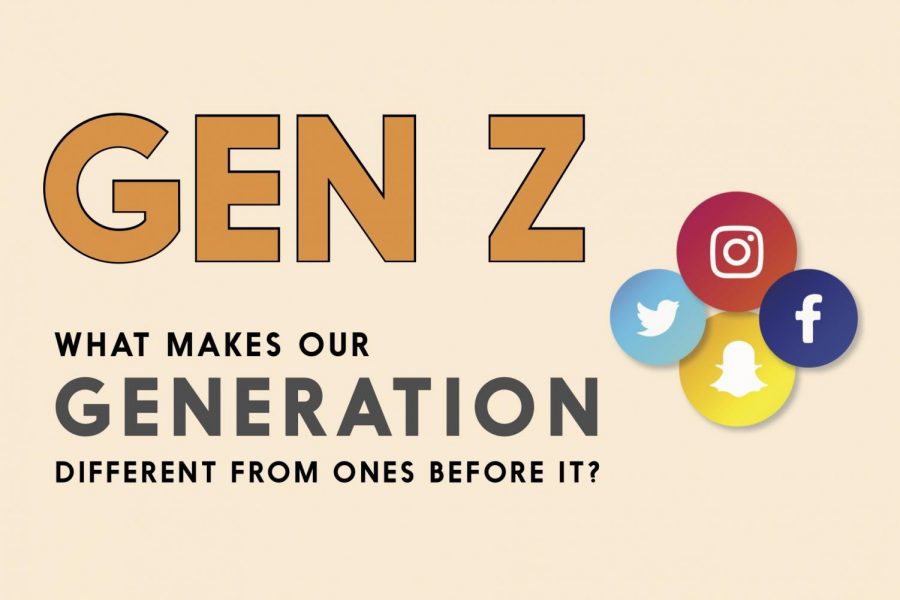Growing up Generation Z
What makes our generation different from ones before it?
They are selfie-takers, avocado-eaters and tea-spillers whose lives are phone-centered and carefree. If any of these clichés sound familiar, it’s probably because you’re part of the generation these labels describe.
Generation Z is the group of individuals born between 1996 and 2010. In the United States, this crowd consists of approximately 61 million people, which is over a quarter of the total population. As the most diverse, technologically advanced generation to date, Gen Z is already making a significant impact on the world. Here’s a look into some of the components that characterize our generation.
Social media
Everyone knows the stereotype for high schoolers today: they’re always glued to their phones. And to an extent, this is true. According to a 2015 Vision Critical study, Gen Z uses smartphones more than any other electronic device, compared to the Millennial generation, who used desktop computers most frequently. The Center for Generational Kinetics reported that more than 55 percent of Gen Z members use their phones for over five hours a day.
“It definitely makes us more aware of what’s going on faster than before in good ways and bad ways. I also feel like people are just saying things just to fit in and understand memes. … I do believe that it has helped us be able to communicate faster and easier, but I also feel like the bad is starting to outweigh the good.” – Favour Alarape ’21
“We have been more exposed to the things that go on in our world and are more educated and informed about different things. Negatively, we have lost a sense of culture. Around the world, many places look alike and there isn’t really any more diversity. Bullying and harassment has definitely increased. We stay glued to our screen and miss out on basic human interaction [because] everything is digital.” – Mariam Keita ’22
“Social media is a double-sided sword. We’re more connected, but also compare ourselves to others more. We’re more understanding of those different than us but also have shorter attention spans.” – Tariq AshShareef ’19
Student activism
As student-run movements emerge across the country, it’s clear that Gen Z individuals want to stand up for what they believe in and strive to make a difference. The March For Our Lives organization is a prominent example of this, as students nationwide joined together to fight for increased gun control and prevention of school shootings. This was mirrored at the local level as well with the creation of Students Against School Shootings (SASS).

“In the past few years, I think that there has been an increase in the amount of activism our generation has participated in. I do think that there is a positive impact to this and our generation, overall, strives to improve the world around us. … Our generation needs to keep getting more involved in activism and realize the potential we have on changing the world for the next years to come.” – McKenna Haag ’19
“Generally, people seem to be more aware of the current events with news being more easily accessible; however, people don’t seem to always go out to do many things. Activism of the past has created the world we live in today, and the activists in the present day are also trying to improve the world for the next generations.” – Caleb Kwok ’20
“In our generation I believe activism is more prevalent than it was in other generations because we have more access to knowledge of what’s happening in the world. I think we strive to improve the world as much as other generations have, but the difference is that we are more aware of these problems than other generations were when our ages.” – Amelia Watson ’19
Consumerism
Growing up in a time where the world is at their fingertips, Gen Z has easier access to purchasing goods and services than any generation before it. This is demonstrated through a shift in consumerism. According to Deep Focus, Gen Z individuals prefer “cool products” to “cool experiences.” Moreover, increasing numbers of individuals in this generation shop online, although many still prefer to shop in-store.
“Everyone wants the new thing. It’s human nature to want things; however, I think that our generation has begun taking it to an extreme. …Our generation is constantly shown what we don’t have, and people make it look extremely fun or popular or something you need.” – Renee Gould ’22
“I believe that our generation is more materialistic than others, as innovations in technology, fashion, etc. are occurring at a much faster rate than in the past. Therefore, this justifies our materialistic desires.” – Caroline Mascardo ’22
“It’s not significant enough to be worth complaining about. Buying things for no reason other than because it’s a popular brand is an all too common tradition. It’s ultimately a waste of money buying things that are not higher quality [but] merely more expensive.” – William Gleason ’20
New language
Definitions courtesy of Urban Dictionary
Boujee: high class; one who possesses swag
Finesse: getting something taken from you in a slick way
FOMO: a state of mental or emotional strain caused by the fear of missing out
Lit: exciting or fun
Selfie: a style of photography where the photographer’s own face is included in the photograph, and the camera is held by the photographer when the photo is taken
Snack: someone who looks good at the moment
Tea: gossip, typically shared between friends
Yeet: a versatile word that can be used as an exclamation, a verb or noun; to discard an item at high velocity
Your donation will support the student journalists of West High School. Your contribution will allow us to purchase Scholarship Yearbooks, newsroom equipment and cover our annual website hosting costs.

Anjali is a senior and third-year staffer on West Side Story. She is the Print Managing Editor and Co-Copy Editor. When she's not complaining about Oxford...

Crystal is a senior at West High. This is her third year on staff and she is a Co-Design Editor on the print section. In her free time, Crystal is either...




